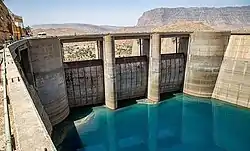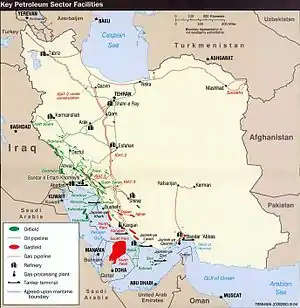
Major dam construction started in Iran in the 1950s. Some fourteen large dams were built with the help of foreign engineers and advisors during two decades preceding the Islamic Revolution in 1979.
In the post-revolution era, Iran's dam building capacity was significantly strengthened, with some 200 contracting companies, 70 consultant firms and 30 corporations as well as hundreds of hydroelectric manufacturing units having been established inside of Iran in less than three decades. In addition to the necessity of generating electricity, Iran needs dams to effectively control and manage a growing water shortage across the country.
Iran was constructing 88 small and large dams in 2007.[1][2] On average, close to two billion cubic meters of water are added to the country’s water reserves annually.[3] As of 2010, Iran has constructed 588 dams (big and small), with 137 more under construction and 546 planned.
Main reservoirs and dams in Iran
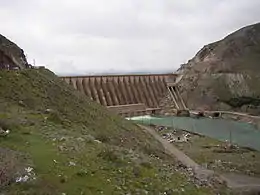
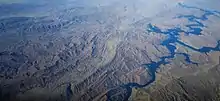
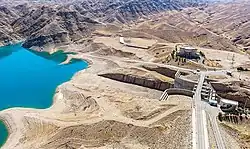
- Alavian Dam
- Alqadir Dam
- Amir Kabir Dam
- Aydughmush Dam
- Azad Dam
- Daryan Dam
- Dez Dam
- Doroodzan Dam
- Ashavan Dam
- Garan Dam
- Gavoshan Dam
- Givi Dam
- Ilam Dam
- Iran–Turkmenistan Friendship Dam
- Jegin Dam
- Jiroft dam
- Karun-1 (Shahid Abbaspour) Dam
- Karun-2 (Masjed Soleyman) Dam
- Kalghan Dam
- Karun-3 Dam
- Karun-4 Dam
- Karkheh dam
- Khoda Afarin Dam
- Kouhrang 1 Dam
- Kouhrang 2 Dam
- Lar Dam
- Latyan Dam
- Mahabad Dam
- Mamloo Dam
- Marun Dam
- Nader Shah dam
- Panzadh Khordad Dam
- Rudbar Lorestan Dam
- Sahand Dam
- Sardasht Dam
- Sefidrud (Manjil) Dam
- Seimare Dam
- Shahid Rajaee (Soleyman Tangeh) Dam
- Shirvan Dam
- Siah Bishe Dams
- Silveh Dam
- Sivand Dam
- Sumbar Dam
- Taleqan Dam
- Talvar Dam
- Tarik Dam
- Upper Gotvand Dam
- Zarrine River (Bukan) Dam
- Zayandeh River Dam
Under construction
- Aras Watershed (Meghri) Dam
- Bakhtiari Dam
- Balvabin Dam
- Khersan-3 Dam
- Kouhrang 3 Dam
- Marash Dam
- Moshampa Dam
Ancient dams
International projects
One of Iran's most important international projects will see the construction of a $200 million hydroelectric dam in Nicaragua, starting in 2011. Iran is currently engaged in dam construction in Tajikistan, Armenia and Azerbaijan, and consultations are under way with a number of other countries. Kenya, Sri Lanka, Bolivia and Mali are the potential target markets being considered for exporting the country's technical and engineering services. In 2010, Iran won a contract to build a dam in Afghanistan and the third contract to build a power plant station in Syria.
See also
Information System of operational Reservoir dams
The daily information of dam operation and inflows, outflows, reservoir volume of operational dams in iran are available at <ref>http://dams.wrm.ir
References
- ↑ Iran Daily - Domestic Economy - 06/27/07 Archived July 2, 2007, at the Wayback Machine
- ↑ Iran Daily - Domestic Economy - 07/23/07 Archived September 8, 2007, at the Wayback Machine
- ↑ Archived June 9, 2009, at the Wayback Machine
External links
- (in Persian) List of reservoirs and dams in Iran Archived 2011-08-03 at the Wayback Machine
